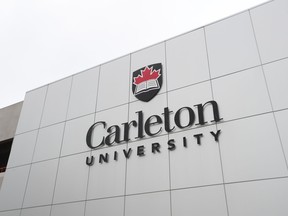Carleton University says anyone affiliated with its Norman Paterson School of International Affairs “could be subject to criminal punishment, including a possible prison sentence,” if they travel to Russian territory.

Article content
Russia’s Ministry of Justice has labeled Carleton University’s international affairs program an “undesirable organization.”
Carleton University says anyone affiliated with its Norman Paterson School of International Affairs “could be subject to criminal punishment, including a possible prison sentence,” if they travel to Russian territory.
Article content
“We strongly advise anyone with a NPSIA affiliation (faculty, students, staff and alumni) to avoid travelling to Russia or Belarus and to curtail research and other partnerships with anyone based in Russia or Belarus at this time,” the university said in a statement on March 20. It did not make any school officials available for an interview on the matter Thursday.
Advertisement 2
Article content
“We are working with our community and partners to review any implications the decision may have,” a media representative of the school said in a statement.
A press release from Russia’s General Prosecutor’s Office said the University of Toronto’s Munk School of Global Affairs and Public Policy has also been deemed “undesirable.”
Both universities, the Kremlin claims, are part of a broader Western campaign to “discredit the Russian Federation and incite anti-Russian sentiments.”
The statement claims both universities have met with leaders of “unfriendly countries with anti-Russian orientation.”
The statement also labels the Russian Canadian Democratic Alliance, a Canadian-based non-governmental organization, as “undesirable.”
Russia launched its invasion of Ukraine in Feb. 2022, killing and injuring thousands.
Since then, Canada has imposed sanctions on Russian individuals and organizations. Canada, in lockstep with the United States and the United Kingdom, recently announced a new spate of sanctions following the death of Russian opposition leader Alexei Navalny, adding 10 people and 153 entities to its sanctions list.
Advertisement 3
Article content
The Kremlin has also sanctioned a number of Canadian public figures, including provincial and federal politicians, Governor General Mary Simon, and Canadian athletes who have supported banning Russian athletes from competing in the 2024 Olympics.
Nicole Jackson, an associate professor of international studies at Simon Fraser University, says the most recent move to deem Canadian universities as “undesirable” could be in retaliation for Canada’s ongoing sanctions, as well as Canada’s continued support for Ukraine.
“Essentially it is about control – (Vladimir) Putin consistently increasing actions to clamp down on dissenting views and attempting to control the narrative,” she said via email.
She said the Canadian institutions should “warn their people not to travel to Russia, and be careful how they communicate with those inside Russia, or could they then face administrative and criminal responsibility.”
Carleton and U of T are “just the latest in a very long list of Putin’s targets,” she added.
According to reporting by Radio Free Europe, the Kremlin adopted its “undesirable organizations” law in 2015, targeting media outlets and organizations that engage in political, cultural and educational activities, as well as support for democratic institutions. Radio Free Europe is one of more than 140 organizations on the “undesirable” list.
Article content



